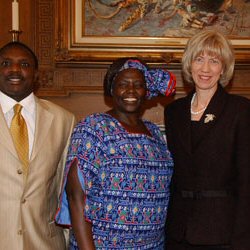 |
"Bias & Bigotry" |
||||
| More... |
Wangari Maathai was born on April 1, 1940, in the rural village of Ihithe, Nyeri District, in the central highlands of Kenya. She was the daughter of Njeri Maathai and Muta Maathai, farmers in a country where agriculture forms the backbone of the economy. Her family's connection to the land and her experiences growing up close to nature profoundly influenced her future environmental advocacy. Maathai was a bright student and earned a scholarship to study in the United States, where she received a Bachelor’s degree from Mount St. Scholastica College in Kansas and a Master’s degree in biological sciences from the University of Pittsburgh. Upon returning to Kenya in the late 1960s, Maathai found a nation grappling with the effects of post-colonial economic and social changes that threatened the environment and traditional ways of life. This period also marked a significant political shift towards authoritarianism under the regime that followed Kenya’s independence. Witnessing the impact of environmental degradation on Kenya's rural populations, especially women, Maathai became deeply involved in environmental activism. In 1977, she founded the Green Belt Movement, an environmental non-governmental organization focused on tree planting, environmental conservation, and women’s rights. Through her work, she emphasized the connection between sustainable development and democratic governance, arguing that environmental degradation leads to social and economic decline that exacerbates poverty and conflict. Wangari Maathai's environmental activism was not just about planting trees but was deeply rooted in her advocacy for human rights, women's empowerment, and political participation. She faced significant opposition from the Kenyan government, enduring arrests and violent attacks for her activism. Despite these challenges, her efforts bore fruit, with over 50 million trees planted in Kenya and many women trained in forestry, food processing, bee-keeping, and other sustainable practices that enhance their economic opportunities and conserve the environment. In 2004, her tireless work earned her the Nobel Peace Prize, making her the first African woman to receive this honor. Maathai's legacy is characterized by her unwavering dedication to environmental stewardship, democracy, and peace, highlighting her belief in the interconnectivity of environmental sustainability and social justice. Her life's work continues to inspire many around the world to take action for the health of the planet and the well-being of its people. Reference: Wikipedia.org |
||||
|
|
